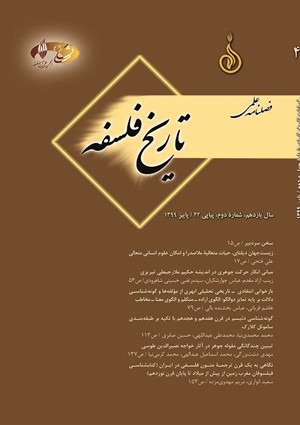زیستجهان دیلتای، حیات متعالیة ملاصدرا و امکان علوم انسانی متعالی
محورهای موضوعی : ریشهشناسی مکاتب و آراء فلسفی در ادوار قدیم و جدید
1 - استاديار گروه فلسفه دانشگاه تهران (پرديس فارابي)، قم، ایران
کلید واژه: علومانسانی هرمنوتیک زیستجهان ديلتاي ملاصدرا اسفار اربعه حیات متعالیه,
چکیده مقاله :
نقش و تأثیر دیلتای در نظریههای مربوط به علوم انسانی کمنظیر است. دیلتای «هرمنوتیک روشی» را در مقابل «روش پوزیتيویستی» علوم طبیعی قرار داد؛ همانگونه که علوم طبیعی روش واحدی دارند، هرمنوتیک نیز روشی برای «علوم انسانی» است. او با تفکیک میان علوم طبیعی و علوم انسانی، برای اینکه بر هویت مستقل آن در برابر علوم طبیعی تأکید کرده و نشان داده باشد که سنخ کار علوم انسانی با علوم طبیعی متفاوت است، تصريح کرد که علوم انسانی با عالم زندگی، تجربة زیسته یا همان «زیستجهان» سروکار دارد. عالم طبیعت، عالم مکانیکی است ولی عالم زنده و زیستجهان، عالم زنده و پویاست و از اینرو سنخ و روش مواجهه با آن با روش علوم طبيعي متفاوت است. در این جستار با استمداد از روش تطبیقی، از مفهوم زیستجهان در انديشة ديلتاي، به جستجوي فلسفة ملاصدرا و حکمت متعالیه رفتهایم و از رهگذر مبانی فلسفی او همچون اصالت وجود، تشکیک وجود، حرکت جوهری، تبیین مفهوم اراده، سیر تکاملی نفس، وحدت تشکیکی عالم و معلوم و نظریة تأویل، از مفهوم «حیات متعالیه» در فلسفة ملاصدرا سخن گفتهایم و کوشیدهایم نشان دهیم که با توجه به این مبانی و مفاهیم، چگونه ميتوان بر بنیاد حکمت متعالیه شرایط امکان «علوم انسانی متعالی» را تبیین کرد.
The influential role of Dilthey is unparalled in theories in the field of human sciences. He contrasted methodological hermeneutics with the positivist method of natural sciences and stated that, as all natural sciences share a single method, hermeneutics functions as a method employed by all human sciences. Through distinguishing human and natural sciences from each other and in order to emphasize that each enjoys an independent identity and demonstrate that the concerns of the two fields are different from each other, Dilthey stipulated that human sciences deal with the world of life, lived experience, or the same lifeworld. The world of nature is a mechanical one, while the living world or life world is alive and dynamic and, thus, the method of treating it is different from that of natural sciences. Using a comparative method, in this paper the author has tried to use the concept of lifeworld in Dilthey’s philosophy as an incentive to explore Mullā Ṣadrā’s Transcendent Philosophy. Moreover, relying on some of his philosophical principles, such as the principiality of existence, gradation of existence, and the trans-substantial motion as well as his explanation of the concept of free will, developmental process of the soul, graded unity of the knower and the known, and the theory of t’awīl, the author has discussed the concept of “transcendent life” in Mullā Ṣadrā’s philosophy. Finally, he has tried to demonstrate how one could explain the necessary conditions for the possibility of “transcendent human sciences” in the light of the above-mentioned principles and concepts.
جوادی آملی، عبدالله (1375) رحیق مختوم، قم: اسراء.
داوری اردکانی، رضا (1387) فلسفه چیست، تهران: پژوهشگاه علوم انسانی و مطالعات فرهنگی.
ديلتاي، ويلهلم (1388) مقدمهاي بر علوم انساني، ترجمة منوچهر صانعي درهبيدي، تهران: ققنوس.
ديلتاي، ويلهلم (1389) تشكل جهان تاريخي در علوم انساني، ترجمة منوچهر صانعي درهبيدي، تهران: ققنوس.
فتحی، علی (1398) «بررسی و تطبیق روش «تحلیل گفتمان» بر فلسفة سیاسی متعالیة صدرا»، سیاست متعالیه، شمارة 26، ص90ـ71.
فتحی، علی (1399) «آگاهی تاریخی، بمثابه بنیاد ابژکتیو علوم انسانی؛ (ملاحظاتی در نقد گادامر بر موضع دیلتای در باب عینیگرایی)»، مجلة علمی پژوهشی روششناسی علوم انسانی، قم: پژوهشگاه حوزه و دانشگاه.
فروند، ژولین (1388) آراء و نظریهها در علوم انسانی، ترجمة علیمحمد کاردان، تهران: مركز نشر دانشگاهی.
مکریل، رودلف (1396) «دیلتای و یورک»، دانشنامة فلسفی استنفورد، ترجمة سیدمسعود حسینی، تهران: ققنوس.
ملاصدرا (1302) مجموعه الرسائل التسعه، تهران: بینام
ملاصدرا (1360) الشواهد الربوبیة فی المناهج السلوکیة، مشهد: مركز نشر دانشگاهي.
ملاصدرا (1363) مفاتیح الغیب، تهران: مؤسسه تحقیقات فرهنگی.
ملاصدرا (1378) اجوبة المسائل، تحقیق عبدالله شکیبا، تهران: بنیاد حکمت اسلامی صدرا.
ملاصدرا (1981) الحکمة المتعالیة فی الاسفار الاربعة، بیروت: دار احیاء التراث العربي.
Dilthey, W. (1989). Introductin to the Human Sciences, Selected Works. R. A. Makkreel and F. Rodi (eds.), Vol. 1. Princeton: Princeton University Press.
Dilthey, W. (1996). Hermeneutics and the Study of History: Selected Works. R. A. Makkreel and F. Rodi (eds.), Vol. 4. Princeton: Princeton University Press.
Dilthey, W. (2002). The Formation of the Historical Worldin the Human Sciences, Selected Works. R. A. Makkreel and F. Rodi (eds.), Vol. 3. Princeton: Princeton University Press.
Gadamer, H. G. (1975). Truth and Method. Tran. by W. Glen-Doepel. London: Sheed and Ward


